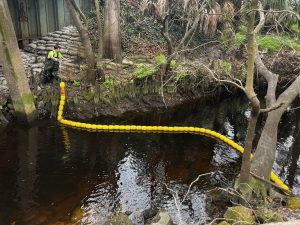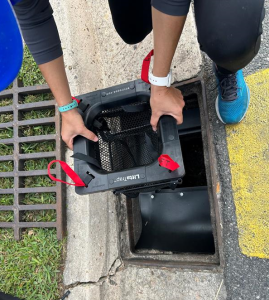Single-use plastic consumption has been steadily increasing since the 1950’s, leading to an increase of garbage in our rivers, streams, and oceans. Recent estimates indicate that 23 million metric tons of plastic end up in aquatic environments around the world. Most marine debris comes from human activities on land, and eventually enters the ocean.
Capturing litter at the source
Operation TRAP’s (Trash Reducation for Aquatic Preserves) mission is to partner with local governments and state Aquatic Preserve systems to intercept litter at the source and reduce the amount of marine debris entering Florida’s coastal waters. The team is installing interception technologies to trap and prevent litter and reduce the amount of single-use plastic materials that enter waterways through drainage systems and boat access points. The interceptor technologies include boom catchment devices, storm drain traps, and monofilament tubes.
The team has begun to install devices in both Cedar Key and Pasco. Our goal is to install 3 booms, 20-25 storm drain traps, and about 20 monofilament tubes in Pasco County and 10 storm drain traps in Cedar Key. On Monday, March 4th, NOAA, UF/IFAS, Pasco County, Keep Pasco Beautiful, and others came together to celebrate the installation of the booms in Pasco County.


With the help of volunteers, the devices will be cleaned out and emptied every 4-6 weeks. The team will organize and analyze all the trash that is collected. Data will be compiled on debris types and amounts collected by each device and shared here. All trash collected will be properly disposed of or recycled at local facilities. The team will utilize clean up events to engage with the community and foster change through data driven education and outreach.


The project serves as a case study and results will be packaged into a municipality toolkit to reduce barriers for adoption by other coastal communities. It will include resources, case studies, answers to frequently asked questions, Florida specific information, and local government points of contact that will encourage other local governments to implement similar approaches in their communities.
Volunteers Needed!
We need your help! Volunteers are needed to clean out, organize, and analyze the amount of litter captured by the devices. We will also utilize clean up events to engage with the community, foster change, and encourage environmental stewardship.
Volunteer options include:
- Adopt-a-Watergoat – Do you have a group that would like to conduct monthly clean ups? Your group can adopt one of our Watergoats in Pasco County. Contact us for more information.
- Monthly clean ups – Sign up as an individual or group here to help us with monthly clean ups of booms, storm drain traps, and monofilament tubes.
All volunteers will be trained and supplied with the tools necessary to perform the clean ups. If you have any questions, please do not hesitate to email Monica Wilson at monicawilson447@ufl.edu.
Operation TRAP is supported by NOAA’s Marine Debris Program with funding provided by the Bipartisan Infrastructure Law and in partnership with FDEP’s Aquatic Preserves, Florida Sea Grant, Pasco County, Keep Pasco Beautiful, and the City of Cedar Key.
 4
4
